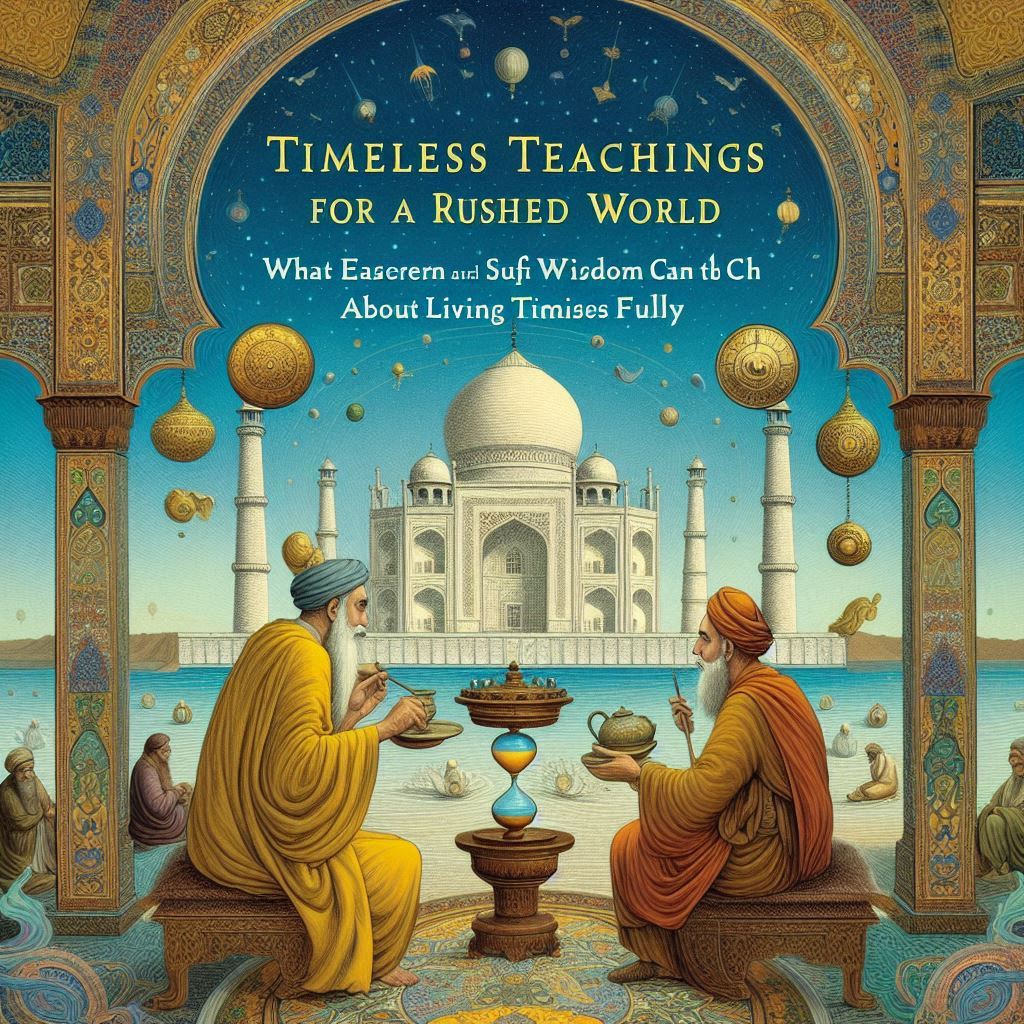Timeless Teachings for a Rushed World: What Eastern and Sufi Wisdom Can Teach Us About Living Fully

Description :
In a world obsessed with speed and success, ancient Eastern and Sufi wisdom offers simple, soulful reminders to slow down, let go, and live with presence. Here’s how these lessons still guide us today.
CHARACTER LEARNING – We live in an age that moves faster than ever. Everything is urgent. We chase goals, check notifications, scroll endlessly—often without pausing to ask, Why am I doing all this?
When I feel overwhelmed, I find myself reaching for something ancient—words, poems, or parables from long ago. Somehow, voices from the past—like Lao Tzu, Rumi, or even local elders whose names never made it into books—bring more clarity than any productivity app or life hack ever could.
Why? Because their wisdom wasn’t born out of rush. It came from stillness. It came from listening deeply—not just to others, but to life itself.
1. Letting Go Isn’t Losing, It’s Liberation – Rumi’s Gentle Reminder
One of my favorite verses from Rumi says:
“Try not to resist the changes that come your way. Instead, let life live through you.”
In modern life, we’re taught to control, to plan, to hold tightly to what we think is best. But the more we cling, the more anxious we become. Rumi invites us to let go—not as a form of giving up, but as a practice of trust.
This doesn’t mean we become passive. Letting go means understanding what is within our control and what isn’t. It means softening our grip on expectations and allowing life to unfold with some degree of surrender.
In that surrender, there is peace.
2. The Power of Not Knowing – Lessons from Lao Tzu
Lao Tzu, the ancient Chinese philosopher and author of the Tao Te Ching, said:
“To know that you do not know is the best.”
In a world where being “right” is everything, this can feel uncomfortable. But wisdom isn’t always about having the answer. Sometimes, it’s about having the humility to admit we don’t know—and the curiosity to keep learning.
In daily life, this could mean listening more than speaking. It could mean not jumping to conclusions about people. It could also mean allowing ourselves to be students of life, even if we’ve lived for decades.
3. The Soul Moves Slower Than the Clock – Eastern Views on Time
In many Eastern cultures, time is not something to be “managed”—it’s something to flow with. There’s a saying in Indonesia, “Alon-alon asal kelakon”—slowly but surely.
Compare that with the common Western phrase, “Time is money.”
This difference in worldview changes everything. If time is money, then every moment must be “productive.” But if time is sacred, then every moment is an invitation to be present.
When I remind myself that the soul doesn’t move at Wi-Fi speed, I stop rushing. I breathe. I realize that the most meaningful parts of life—like love, growth, or healing—can’t be hurried.
4. Silence Is Not Emptiness – It’s a Form of Listening
There’s a beautiful Sufi saying:
“Silence is the language of God, all else is poor translation.”
We are surrounded by noise—literal and emotional. But in silence, we meet something deeper. We start hearing not just the world, but our own hearts.
Taking five minutes of silence each day—no phone, no thoughts to chase—can be more transformative than hours of scrolling through motivational content.
Silence reconnects us with what’s real. And what’s real is often quiet.
5. The Ordinary Is Sacred – Seeing the Divine in Daily Life
Many Eastern and Sufi teachings don’t separate the spiritual from the everyday. Making tea, walking, cleaning the house—these can all be acts of worship if done with presence.
I once heard a Zen teaching: “When you wash the dishes, wash the dishes.”
It sounds so simple, even silly. But in practice, it’s profound. So much of our stress comes from being here while our minds are there. The past, the future, the what-ifs. But when we’re fully present—even in mundane tasks—life feels less fragmented.
Suddenly, the ordinary becomes sacred.
6. Humility Over Hype – The Wisdom of the Quiet Ones
Modern culture loves to celebrate the loudest voices, the biggest achievements, the most followers. But Eastern and Sufi traditions often uplift the opposite: humility, simplicity, the quiet heart.
In fact, the greatest teachers rarely saw themselves as “great.” They simply lived in alignment with their values, and their lives became the teaching.
We don’t need to “brand” ourselves to be meaningful. We just need to live with sincerity. Quiet lives can be deeply impactful—perhaps more than we’ll ever know.
7. Everything Passes – So Love While You Can
Eastern philosophy and Sufi poetry often speak of impermanence. In Buddhism, this is called anicca. In Sufism, it’s seen in metaphors of the fading rose, the passing wind.
Instead of being depressing, this awareness helps us love more deeply. Because we know things don’t last forever, we hold them more tenderly.
That friend, that moment with your child, that walk at sunset—it’s all temporary. And that’s what makes it beautiful.
In the End: Ancient Voices, Modern Hearts
These teachings aren’t just poetic—they’re deeply practical. They remind us that:
- Slowness isn’t laziness.
- Surrender isn’t weakness.
- Silence isn’t emptiness.
- Not knowing isn’t failure.
- And presence is the highest form of prayer.
You don’t have to change your whole life to apply them. Maybe it starts with one pause before you react. One breath before you speak. One moment where you choose to listen, instead of rush.
Ancient wisdom doesn’t ask for perfection. It just asks us to be real—to show up with a little more awareness, a little more heart.
And maybe that’s enough.[*]
